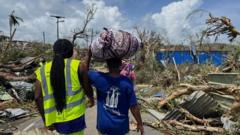The United Nations' recent analysis reveals that current global efforts to reduce carbon emissions are inadequate, with projected decreases insufficient to meet the ambitious goal of limiting warming to 1.5C. Forests are losing their capacity to absorb carbon, exacerbating the situation as world leaders prepare for COP29.
UN Warns Global Climate Efforts Severely Lagging Behind Targets

UN Warns Global Climate Efforts Severely Lagging Behind Targets
According to a new UN report, the world's strategies to combat climate change are falling significantly short, with greenhouse gas emissions rising more rapidly than ever.
Global initiatives to address climate change are not making sufficient progress, as indicated by a recent report from the United Nations. The analysis highlights that the accumulation of greenhouse gases is currently escalating at an unprecedented rate, raising concerns over the effectiveness of existing national plans aimed at curbing emissions.
The UN’s examination of climate action plans submitted by approximately 200 countries reveals a disappointing outlook. Projections suggest that emissions will only decrease by 2.6% by 2030 compared to 2019 levels. This is dramatically below the 43% reduction scientists deem necessary to stay on course for achieving net-zero carbon emissions by 2050. UN Climate Change Executive Secretary Simon Stiell characterized these findings as “stark but not surprising,” emphasizing that current measures are vastly insufficient to avert severe economic and environmental repercussions globally.
Moreover, a parallel report indicates that greenhouse gas levels have surged by over 11% over the past two decades, with concentrations continuing to climb in 2023. Researchers underscore growing apprehension about the declining efficiency of forests in sequestering carbon. Severe forest loss, particularly in regions such as the Amazon, not only threatens biodiversity but also interacts negatively with climatic conditions, reducing precipitation and further diminishing forests’ carbon absorption capabilities.
The World Meteorological Organization (WMO) has noted a record high of greenhouse gases in 2023—a trend amplified by record-breaking wildfires in Canada and the effects of the El Niño weather pattern, alongside persistent emissions from fossil fuels. Dr. Oksana Tarasova of WMO has pointed to observable changes in natural systems that may worsen climate impacts, where climate feedbacks, such as transforming carbon sinks into carbon sources, can accelerate global warming.
As the climate crisis escalates, nations are urged to submit improved and more ambitious plans in time for the next UN climate conference, COP29, scheduled for next month in Azerbaijan. This meeting is expected to focus heavily on enhancing the global response to climate change, necessitating urgent debate about the required commitments to mitigate potentially catastrophic outcomes.






















